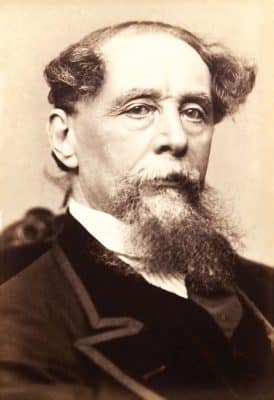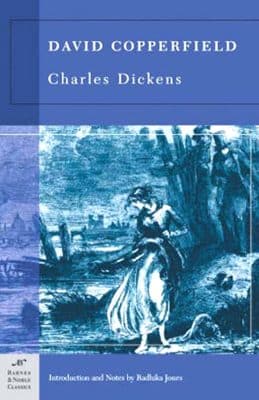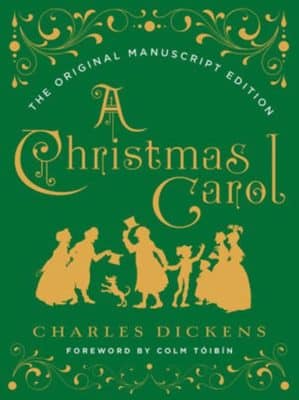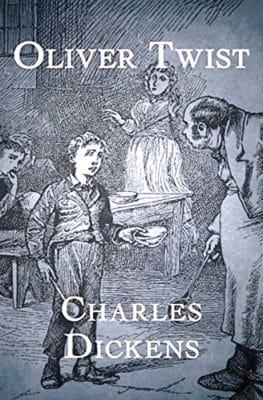
Charles Dickens was a writer born to the breed. His father, John, was a journalist, a trade his son would also excel in. Dickens had an unhappy youth. John Dickens pulled his son from grade school and sent him to work in one of those child labor factories that were the scourge of the 19th century. The young Dickens hated it. But Dickens was resilient. He latched onto work in newspapers and began writing fiction. At age 25, he published The Pickwick Papers, a critical and financial success that launched the most successful literary career of the century. Flannery O’Connor declared that if a young person survives high school, they have enough to write about for the rest of their lives. Dickens survived a hellish youth. He saw, early on, the world of greed and exploitation. It gave him his own lifelong subject.
Dickens became a phenomenon. The 19th century was the peak of modern Britain and London was the world’s most populous city. The British pound sterling dominated the world’s currency; its Navy ruled the seas. The novels of Charles Dickens, similarly, announced the centrality of British life to world history.
Dickens explored this great spinning world in one sprawling novel after another. His theme was simply how to make sense of an age, that his biographer Jane Smiley claimed, was defined by triumphant capitalism, high speed travel, freedom of action and the dissolution of old neighborhoods. Dickens was the ideal artist to capture all of British life. As another critic observed, the novelist represented no group and thus, was able to represent all groups.
A self-made man who admired other self-made men, Dickens wrote of the young man who overcomes daunting obstacles of a treacherous urban/industrial order, growing into a manhood that does the right thing by friends, family and community. The titles continue to ring out throughout the ages: David Copperfield, Great Expectations, Oliver Twist, A Tale of Two Cities, Hard Times, The Pickwick Papers, Bleak House, Little Dorrit and Dombey and Sons. And consider the names of his cast of characters. Where did they come from? They all have a way of sucking the reader in by their sheer vividness: Major Bagstock, Peckinsniff, Caddy Jellby, Jingle, Mrs. Bumble, Dick Sweveller, Mrs. Micawhers, Sissy Jupe, Uriah Heep, Madame DeFarge. Not since Shakespeare had so many rich and colorful characters flowed from a man’s pen.
Dickens continued to amaze. Think of the novelist as a one-man version of The Beatles or The Rolling Stones. He reveled in public readings. Dickens remains beloved for A Christmas Carol. The man would spend weeks preparing for his reading of that classic before embarking on nationwide tours. It worked. Dickens read before packed houses, while collecting handsome fees. Audiences sat transfixed, they laughed, cried and applauded. It’s a wonder that Dickens had the discipline to get back to the writing table.
A prolific novelist and performer, Dickens’ career represented a stunning breakthrough. For centuries on end, the writer had to console himself that recognition, not to mention some real money, would never come his way during his lifetime. The writer could only hope to be discovered and appreciated posthumously. The 19th century and the triumph of mass communication through the newspaper and periodicals changed all that. The writer, if he had the wits, could now become a performer, even a celebrity. Dickens’ readings were so spellbinding that other writers saw their opportunity. Mark Twain and Oscar Wilde all exploited this medium to create a public image, as did 20th-century greats: Ernest Hemingway, Robert Frost, Norman Mailer and Tom Wolfe, with the latter two, among many others, now using television to enhance their fame.
There is nothing like a writer reading from his work. There are no recordings of Dickens, but only consider T.S. Eliot reading “The Waste Land” or William Faulkner reciting his Nobel Prize acceptance speech or W.B. Yeats literally singing his verse. No Olivier or Hepburn could match it. Only imagine the thrill it was to hear Dickens reading his perfectly constructed narratives.
Dickens was the first significant British novelist since Sir Walter Scott. His career opened the floodgates for a generation of novelists and writers all inspired by his amazing productivity, all, too, trying to make sense of a triumphant modernity. The latter half of the century included such greats as George Eliot, Sir Albert Tennyson, George Meredith, Wilkie Collins and the great Russians: Feodor Dostoevsky, Leo Tolstoy, Ivan Turgenev, Nikolai Gogol and Anton Chekhov. France saw the rise of Victor Hugo and Gustav Flaubert, while a rambunctious America countered with Mark Twain, James Fenimore Cooper and Herman Melville.
Dickens and his wife had 10 children. None of them had their father’s ambition. He didn’t encourage such ambition, either. Ambitious people are rarely happy people. The burden is too great. Dickens was prolific to the end. Smiley believes his last novel, Our Mutual Friend, was his most satisfying novel. The man, at the end of his career, was liberated from making yet another critique of British life. Instead, he celebrated the goodness of its people as they battle the corruption epidemic to big city life. “Our Mutual Friend is Dickens’ perfect novel, seamless and true and delightful in every line,” Smiley contends. As a performer and as a novelist, Dickens knew how to go out on top.





















